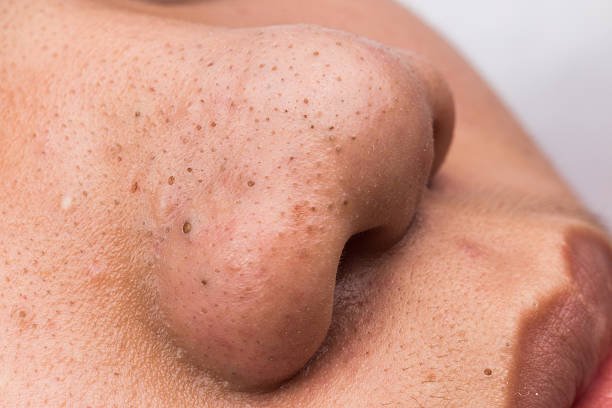Deep blackheads can really stand out, especially when you want to look your best for an important event. It’s normal to want to know how to get rid of them. But, many common methods like using honey, egg whites, pore strips, or Epsom salt don’t have strong scientific evidence to support them.
Don’t stress! There are proven ways to remove deep blackheads and stop them from returning. Let’s explore these effective methods together.
Causes of Deep Blackheads
Blackheads are a sign of acne, a common skin condition that affects your pores. Some people with acne have other signs like swollen pimples, but others just have blackheads.
Scientists say that one big reason for acne is when your skin makes too much oily stuff called sebum.
When you have acne, your pores can get clogged up with a mix of sebum and dead skin cells. These clogged pores are called comedones. If a comedone is open and at the surface of your skin, it looks like a black spot because the trapped stuff turns dark. That’s why we call them blackheads. Some blackheads are even deeper in your skin.
Certain people might be more likely to get deep blackheads. Scientists have seen that you’re more likely to have acne if you:
- Are a teenager
- Have family members with acne
- Are having your period
- Are feeling stressed
What Makes Deep Blackheads and How Do They Show Up?
Just like other acne, too much oil production in your skin is the main reason for deep blackheads. When too much oil, plus dead skin cells, pile up inside your pores, they make a clog. In the case of blackheads, this clog pops out on your skin’s surface. When this stuff meets the air, it turns black because of oxidation.
Deep blackheads are really stubborn, and your usual skin cleaning may not do the trick. It’s not a good idea to poke or prod them because that often doesn’t work and can harm your skin. But don’t worry, you can still beat them! Keep reading for some safe ways to remove deep blackheads.
Top Methods to Get Rid of Deep Blackheads
1. Trying Tea Tree Essential Oil:
Tea tree essential oil is a different way to deal with blackheads, but there’s not a lot of research on it yet. In one study, they compared tea tree oil to benzoyl peroxide for acne treatment, and both worked pretty well. Tea tree oil was a bit slower, though. More research is needed to say for sure if it’s great for deep blackheads, but it’s safe to give it a try. You can mix tea tree oil with steam to open up your pores and help get rid of gunk and extra oil.
For other treatments like chemical peels or using special tools to remove blackheads, it’s best to see a dermatologist. So, when should you go to one?
2. Consider Retinoids:
Retinoids are like superheroes for your skin. They stop skin cells from bunching up, control oil, and speed up how fast your skin heals. That’s great news after you’ve dealt with blackheads. Retinoids also help your skin make more collagen, so it looks healthier. If you’ve had deep blackheads for a while, you can try over-the-counter creams with retinoids. But if you want something stronger, a prescription from your dermatologist could work better. They can guide you on which one to use.
3. Using Benzoyl Peroxide for Blackheads:
Benzoyl peroxide is a strong anti-inflammatory that can help calm down redness and swelling around blackheads or after you’ve removed them. It’s also good at getting rid of dead skin cells and extra oil. You can find benzoyl peroxide in different forms, like gels, body wash, face wash, foam, creams, and lotions. You can pick the one that suits you, but don’t use too much because it can make your skin too dry.
4. Try Salicylic Acid:
Salicylic acid is a natural substance used to treat acne. It’s famous for exfoliating your skin, removing dead cells, and fighting inflammation and bacteria. Salicylic acid is different from other acids because it can dive deep into your skin where blackheads hide. It can clear away the extra oil that’s deep in your pores, helping to unclog those stubborn blackheads. Plus, it keeps dead skin cells from sticking together, which means fewer blackheads might form. You can find salicylic acid in moisturizers, toners, face washes, or exfoliants for your everyday skincare. If you want to use a chemical peel with salicylic acid, it’s best to chat with your dermatologist because it can be pretty strong.
Do Home Remedies Really Work?
While you might find many DIY “home remedies” online for removing blackheads, none of them are proven to work.
In fact, some of these so-called remedies could make your acne even worse.
If you still want to try a home remedy, be super careful. Test it on a small area of your skin, like your forearm, first and wait overnight to see how your skin reacts.
Home Remedies That Could Be Harmful
Some common things recommended as blackhead “remedies” can actually be bad for your skin. These include:
- Apple cider vinegar
- Baking soda
- Epsom salts
- Lemon
- Toothpaste
People think these ingredients can soak up oil and remove dead skin, but they can be too harsh and make your skin irritated, swollen, and lead to more breakouts.
Home Remedies That Might Not Always Work
Some remedies aren’t harmful, but they might not work well for deep blackheads. These include:
- Egg whites
- Green tea
- Honey
- Yogurt
These things are sometimes used in DIY masks because they have good stuff in them like antioxidants and moisture, but they might not help with deep blackheads.
What if you need professional help?
Usually, you don’t need professional help unless your blackheads are causing a lot of pain or swelling.
But if your home remedies aren’t working, it’s a good idea to chat with a dermatologist or skincare expert. They can suggest these options:
- Professional Extraction: A dermatologist or skincare expert makes a tiny hole in the clogged pore and uses a special tool to take out the stuff inside.
- Microdermabrasion: This is like a super-powered exfoliation. They use a machine to spray tiny crystals on your skin, and it sucks away the dead skin. It can also make big pores look smaller.
- Chemical Peels: Pros use special chemicals to peel away the top layer of your skin, which gets rid of blackheads and other gunk. But after this, your skin can get sunburned easily, so you gotta be careful in the sun. Sunscreen is a must, and a hat’s not a bad idea either.
- Laser Therapy: When other treatments don’t work, they might try lasers. For deep blackheads, they use something called photopneumatic therapy, which is a mix of strong light lasers and a little vacuum. This combo helps the dermatologist get deep into your pores to clean them out. You might need a follow-up session once or twice a year for the best results.
How to Prevent Deep Blackheads?
Preventing deep blackheads is a good goal. Some people are more likely to get them, especially if they have oily skin. You can take steps to keep them away:
- Stick to a skincare routine: Clean, exfoliate, and moisturize your skin regularly.
- Use products that match your skin type.
- Stay hydrated by drinking plenty of water. Related…..How much water should you drink per day?
- Don’t ignore blackheads and whiteheads when they show up.
- Eat a diet rich in fruits, nuts, veggies, and low in processed carbs and added sugars.
In a nutshell, deep blackheads are a type of stubborn acne with deeply clogged pores. They often happen if you have oily skin. But you can treat them with things like retinoids or salicylic acid, or even with a dermatologist’s help. Plus, a good skincare routine and healthy lifestyle choices can help you stop deep blackheads from forming.
When to See a Dermatologist?
Sometimes, home treatments might not be enough to get rid of really deep and tough blackheads. If your deep blackhead is too stubborn, or if you think it might be infected because you poked or squeezed it, it’s a good idea to reach out to a dermatologist. Signs of infection include fever, swollen, or sore blackheads. But even with a dermatologist’s help, removing deep blackheads can be a bit uncomfortable.
Frequently Asked Questions
1. Do deep blackheads create holes in your skin?
Sometimes, after you remove blackheads, you might notice marks that look like tiny holes on your skin. These are actually enlarged pores that got deeper and wider due to the buildup. But, with time, these holes or larger pores usually heal and go back to their normal size.
2. Is it better to pop blackheads or leave them?
Popping blackheads on your own can lead to scarring, skin irritation, and infections. On the other hand, leaving them alone might cause them to go deeper into your skin, making removal harder. It’s usually safer to use proven home remedies or consult a dermatologist for help.
3. Can baking soda help get rid of deep blackheads?
Some people suggest making a paste with baking soda and toothpaste and putting it on your face to remove blackheads and dead skin cells. However, there’s no scientific proof that baking soda can effectively remove deep blackheads.
4. Are Blackheads Contagious?
No, blackheads are not contagious. You can’t pass them on to someone else through skin contact.
5. How Do You Know If You Have Blackheads?
Blackheads are pretty easy to spot, so you usually don’t need a doctor to tell you. But if you have them along with more serious types of acne, it’s a good idea to see a dermatologist, a skin specialist.
6. What Are the Signs of Blackheads?
Blackheads are a mild type of acne. They look like dark, open bumps on your skin. Unlike whiteheads, they don’t hurt or feel uncomfortable.
7. Who Gets Blackheads?
Blackheads are common in teenagers and young adults who are going through changes in their hormones. But plenty of adults have them too, even into their 20s, 30s, and beyond. Some people may get blackheads for the first time as adults.
Summary:
In simple terms, removing blackheads can be tricky, but these home methods can help. If you don’t notice any changes in about 6 weeks, it’s a good idea to see a dermatologist or skincare pro for expert advice on professional treatments.


